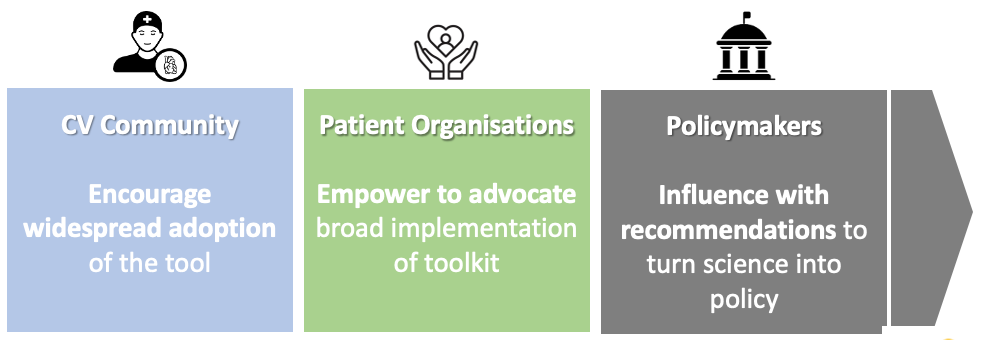Initiated in April, the pilot testing of the RESIL-Card tool is coming to an end. The results of the pilot tests are expected in November 2025 and will help the consortium to refine the components of the resilience assessment tool. A new version will then be released in time for dissemination in 2026.

Over the coming months, the consortium will step up its efforts to finalise its plan for the active dissemination of the RESIL-Card tool across Europe. Specifically, the objective is to spread and scale up the project results and deliverables to ensure lasting impact and sustainability beyond the end of the funding period.
One of the key outcomes, if not the most important, will be making the tool available to anyone who is interested in using it. To support its active dissemination across Europe, consortium members will engage with different target groups. The cardiovascular (CV) community – the tool’s intended users – will be the primary focus of dissemination and communication activities, which will aim to encourage the tool’s widespread and systematic adoption in hospitals. The consortium will also collaborate closely with national patient organisations, with the support of project partner Global Heart Hub, to raise awareness among patients and public of improved preparedness and resilience in CV care pathways, as well as to empower them to advocate for the broad adoption of the tool by CV professionals and policymakers. Finally, direct actions aimed at European and national policymakers will encourage them to endorse the tool and develop policies to support the preparedness and resilience of CV care pathways.

Ahead of this critical phase for the project’s success, the results of the pilot phase will be presented at several events scheduled until the end of the year, with the aim to generate interest among professionals involved in caring for patients with cardiovascular disease (CVD). These events include a session with one of the JACARDI work streams (the European Joint Action on Cardiovascular Diseases and Diabetes), the annual congresses of several national cardiology societies, and the 48th World Hospital Congress. The latter event will provide an excellent opportunity to engage with leaders and decision-makers from hospitals, health services, and healthcare organisations, who are also key stakeholders in improving the preparedness and resilience of care pathways. A poster presentation will explain the methodology adopted by the consortium to develop the tool. This approach is the subject of an article that was submitted to the BMJ Open journal earlier this month and is currently available as a preprint.
Although engaging with policymakers is essential for achieving the project’s desired impact, this objective is not always easily attained. RESIL-Card is particularly pertinent at the EU level, given the favourable context characterised by two important EC focuses: preparedness and crisis management (EU Preparedness Union Strategy) and CVD burden reduction (EU CV Health Plan). The consortium recently contributed to the public consultation launched by DG Santé regarding the next steps in developing the European CV Health plan. They strongly recommended the inclusion of measures to improve the preparedness and resilience of CV care pathways, thereby enhancing public health at the individual and societal levels, whilst guaranteeing the continuity of lifesaving CV care when Europe needs it most.
As resilience in action is coming soon, keep following for the rollout of RESIL-Card and get ready to transform cardiovascular care next year!